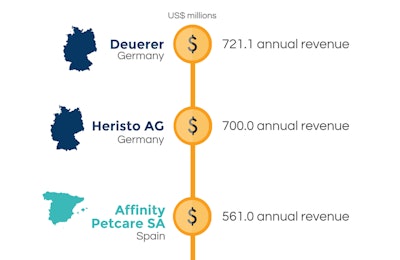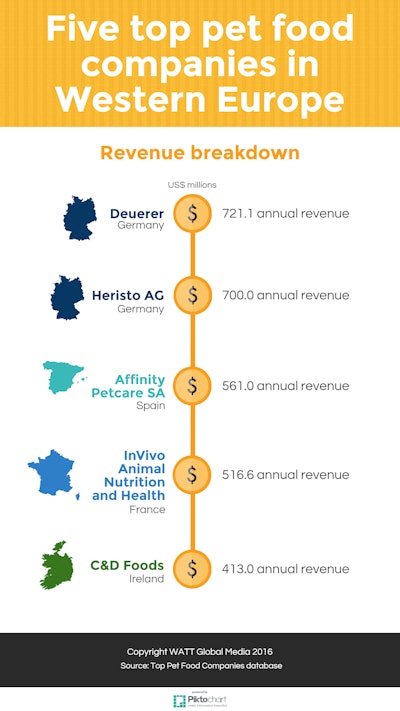

Share this Image On Your Site
Deuerer – Germany -- US$721.2 million annual revenue
Heristo AG – Germany -- US$700.0 million annual revenue
Affinity Petcare SA – Spain – US$561.0 million annual revenue
InVivo Animal Nutrition and Health – France – US$516.6 million annual revenue
C&D Foods – Ireland – US$413.0 million annual revenue
Western Europe-based pet food companies predominate on the list of European companies in Petfood Industry’s Top Companies Database. Five of those pet food and pet treat companies achieved annual revenues of more than US$400 million (EUR361 million).
European pet food market in 2015
Europe ranks second in pet food sales after the US. However, the region saw only slight growth overall in 2015 for a total of US$20 billion (EUR18 billion) sales, according to a Gfk webinar on global pet food industry growth. That figure includes about US$4 billion (EUR3.6 billion) each for Germany, UK and France; US$2.6 billion (EUR2.3 billion) for Germany, US$1.5 billion (EUR1.4 billion) for Spain, US$325 million (EUR293 million) for the Czech Republic and US$150 million (EUR135 million) for Greece.
Growth trends in Europe's pet food market
Among 21 European nations, a total of 75 million households owned at least one pet in 2014, according to an estimate by the European Pet Food Industry Federation (FEDIAF), the umbrella association for various countries’ pet food industry associations.
Annual sales of pet food products in Europe resulted in an annual turnover of an estimated EUR15 billion (US$16.7 billion) in 2014, according to the most recent FEDIAF report. That revenue resulted from sales of approximately nine million metric tons (9.9 US tons) of pet food.
The European pet food industry grew by approximately 1.8 percent over the three years leading up to 2014, according to that FEDIAF report. That growth fueled the operation of 650 plants. At those facilities, 80,000 people were directly employed. Another 700,000 people had indirect employment via positions in the veterinary field, pet specialty stores, suppliers, trade shows and related industries.


















